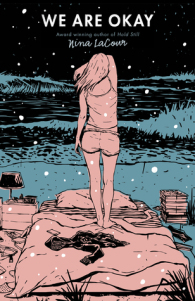Buy this from Bookshop.org to support local bookstores and the Lesbrary!
When I first picked up Nina LaCour’s We Are Okay and read the blurbs on the cover, I knew that it was going to be a sad one. After all, the noun “grief” appears multiple times alongside adjectives such as “devastating”, “raw”, and “lonely”. Still, I thought to myself, “I’ve read poignantly sad books before. How bad could it be?” Y’all, let me tell you that I was not prepared for how hard this book hit me. It is no exaggeration for me to say that I cried throughout large sections of it. The blurbs were true: We Are Okay is a beautiful and heartbreaking look at grief, its effects on people, and ultimately how the truth can help see us through.
Following a tragic event that shook Marin to her core, she leaves her California hometown for college in New York with only her phone, her wallet, and a picture of her mom. With the end of her first semester upon her, she still hasn’t spoken to anyone from home, not even her best friend Mabel. Instead of returning home, she plans to spend the entire Christmas break alone in an empty dorm. However, Mabel is coming to stay for three days of the break, forcing Marin to confront what happened and figure out if there is a way forward for her.
There is so much that Nina LaCour does in We are Okay that makes it so emotionally devastating. For starters, the language and writing style she employs really set the tone and sell the rawness of Marin’s emotions. Sentences tend to be shorter and more punchy and Nina avoids hiding things behind flowery metaphor. At the same time, she does an excellent job of showing Marin’s emotions rather than simply telling us what they are. These things combine in a way that either puts you directly into her shoes or makes you deeply empathize with her.
Another thing that really sells the emotions of this book is the use of flashbacks and the slow reveal of the traumatic event. For most of the book, you flip back and forth between Marin now and Marin before the event. You get to see a younger, happier, more hopeful version of Marin directly contrasted to the Marin who has had that hope and happiness ripped away. By doing this and not revealing what happened until the third act of the novel, the mystery is properly built up and makes for an intensely heart-wrenching moment in the story when the curtain is pulled back.
I also think Nina’s choice of setting the story around the first semester of college added to its overall impact. Living in a college town and working directly with college students, I see first-hand how hopeful and exciting that first semester of college can be for many of them. That first semester is a chance to reinvent oneself or engage in self-discovery. This new self then goes home and has the potential to crash against how people there once saw you. Marin’s experience is similar in a lot of ways to this, but in a much sadder fashion. She changes because change is foisted upon her by tragedy. Instead of going home, home comes to her and forces her to reckon with those changes.
Lastly, as sad as this story is at times, I did enjoy that it ended with at least some sense of hope. If this was a story that ended on a more downbeat tone or even mixed tone, I know I wouldn’t have enjoyed it at all.
We Are Okay is a book that emotionally destroyed me and left me bawling in my reading chair. That being said, it’s an experience that I am so happy that I got to have and will recommend to anyone else who asks about it. It’s a moving story of grief, what it does to us, and how we can slowly but surely come to live with it by, in part, opening ourselves up to others.


